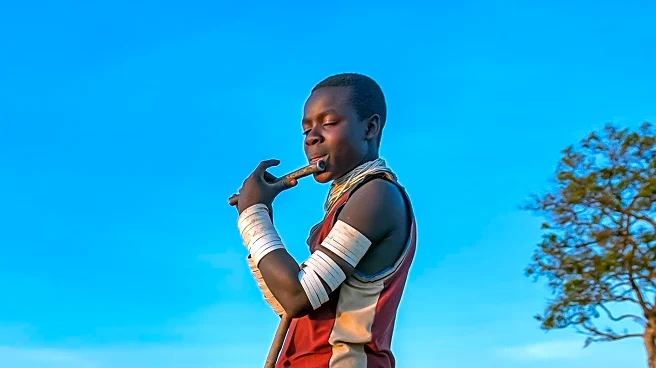What's Happening?
In rural Zimbabwe, girls are reviving the ancient tradition of Nhanga to combat child marriage. Nhanga, traditionally a space for preparing girls for marriage, is now a peer-led movement addressing modern issues like child marriage, teen pregnancy, and
gender bias. The initiative, supported by the Rozaria Memorial Trust, provides a safe space for girls to discuss sensitive topics and learn practical skills. Despite laws against child marriage, cultural and religious customs persist, making this grassroots effort crucial. The program has expanded to include mentorship and practical skills training, empowering girls to resist early marriage and pursue education.
Why It's Important?
The revival of Nhanga is significant in addressing child marriage, a prevalent issue in Zimbabwe and other African countries. By empowering girls through education and mentorship, the initiative challenges entrenched cultural norms and offers a path to independence. Child marriage often leads to negative health and economic outcomes, making this movement vital for improving the lives of young girls. The program's success in Zimbabwe has inspired similar initiatives in other countries, highlighting the potential for cultural traditions to be adapted for modern social change. The involvement of community leaders and government officials underscores the importance of collaborative efforts in tackling societal issues.
What's Next?
The Nhanga initiative continues to expand, with more schools adopting the model and reaching international forums. Efforts to involve community leaders and enforce rules against early marriage are ongoing. The program aims to change attitudes among adults, who often view child marriage as indiscipline. The government policy allowing girls to return to school after childbirth is a positive step, but further advocacy is needed to ensure its implementation. The initiative's success may lead to increased support from NGOs and international organizations, furthering its reach and impact.
Beyond the Headlines
The Nhanga revival highlights the power of grassroots movements in driving social change. It challenges patriarchal norms and promotes gender equality, offering a model for other communities facing similar issues. The initiative's focus on practical skills and economic empowerment addresses the root causes of child marriage, such as poverty and lack of education. By involving girls in the solution, the program fosters a sense of agency and community responsibility. The movement's success may inspire further cultural innovations to address other social challenges.















